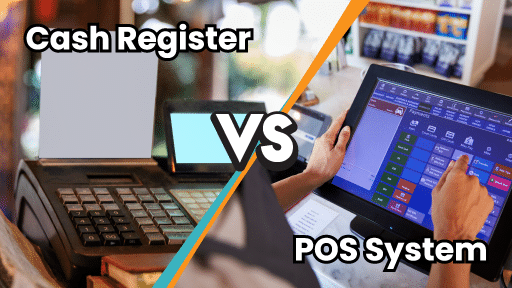We all remember the days of clunky, nostalgic cash registers. Times have changed, and we’re now in the age of sleek, touchscreen point-of-sale (POS) systems. What is the difference between cash registers and POS systems anyway? And what changed when we transitioned?
Whether you’re a small business owner pondering an upgrade to POS or a tech enthusiast exploring the evolution of retail, we hope this post will help you learn something valuable.
Key Differences
This chart offers a comprehensive overview of the key similarities and differences between a cash register and a POS system:
Feature | Cash Register | POS System |
Hardware | Usually consists of a drawer, keyboard, and display. | Includes a computer, touchscreen monitor, barcode scanner, receipt printer, and often a cash drawer. |
Transaction Processing | Basic functionality limited to cash transactions and manual entry of prices. | Processes various payment types, including cash, credit/debit cards, mobile payments, and more.
|
Inventory Management | No inventory tracking capabilities. | Robust features like real-time tracking, stock alerts, and automatic reordering. |
Reporting | Basic reporting features such as end-of-day sales totals. | Provides detailed reports on sales, inventory levels, employee performance, and more. |
Integration | Can integrate into POS systems. | Integrates with other business systems such as accounting software, CRM tools, and more. |
Scalability | Limited scalability for growing businesses. | Scalable to accommodate the needs of growing businesses, including multiple locations. |
Cost | Generally lower initial cost but may require ongoing maintenance. | Higher initial investment offers long-term savings in the long run through increased efficiency. |
User Interface | Usually limited to physical buttons and a small display. | Offers intuitive touchscreen interfaces with customizable layouts for ease of use. |
Customer Management | No customer management features. | Can store customer data, track purchase history, and implement loyalty programs. Add New |
What Is a Cash Register?
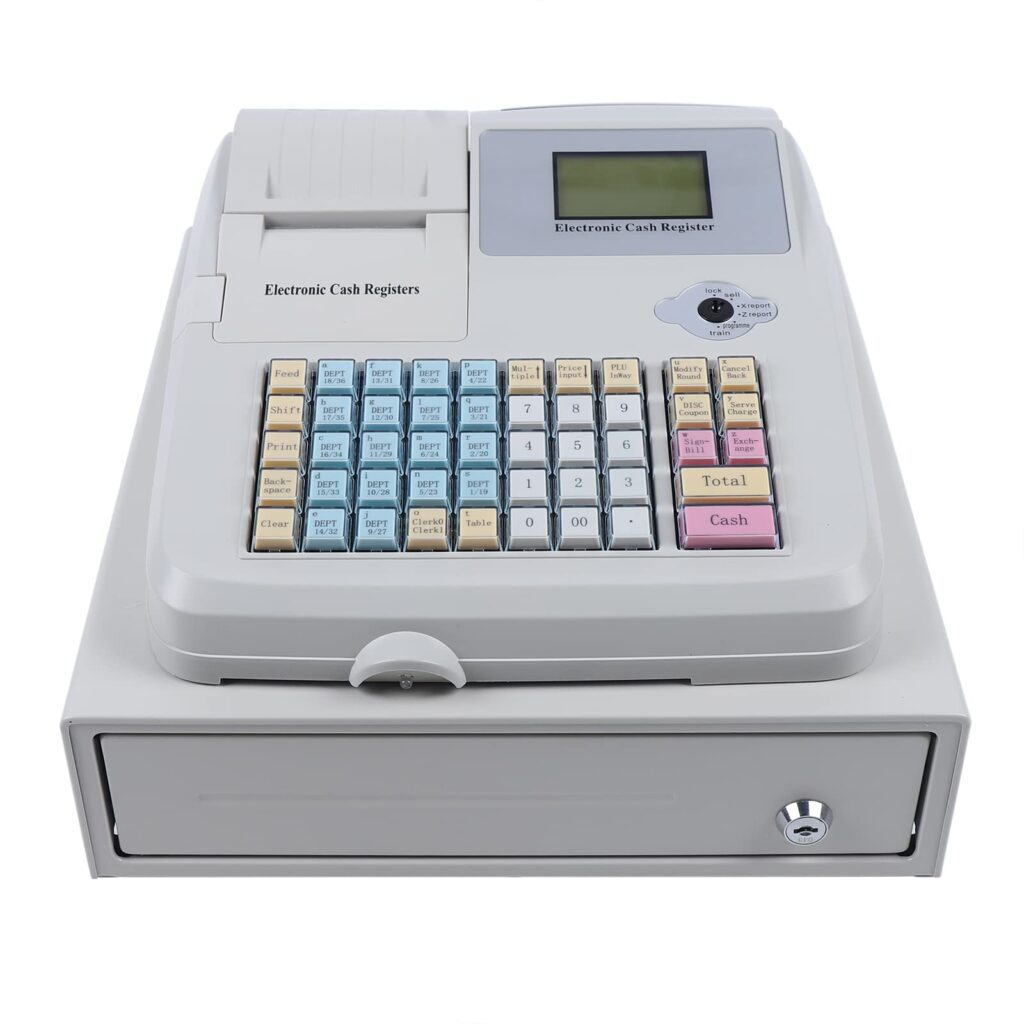
The cash register emerged in the late 19th century as a mechanical device to record sales transactions. It serves as a basic point-of-sale terminal, facilitating the exchange of goods and services for payment. Despite technological advancements, cash registers remain valuable for small businesses and environments with simple transaction needs.
Cash Register Functions
Cash registers can ring up and process transactions and complete rudimentary calculations like tax and change. They can also:
- Record sales transactions – Cash registers tally the cost of items purchased, calculate the total amount owed, and process payments, whether in cash, card, or other forms. They also compile simple end-of-day (EOD) reports.
- Manage cash – Cash registers store money securely in designated compartments, allowing cashiers to give change to customers and maintain accurate cash balances throughout the day.
- Generate receipts – Cash registers print itemized receipts for customers, providing a record of their purchases and serving as proof of transaction for returns or exchanges.
Cash Register Limitations
- Limited functionality – Cash registers lack advanced features such as inventory management, sales analytics, and digital payment processing, hindering business operations and growth.
- Manual processes – Transactions and calculations on a cash register are typically performed manually, increasing the risk of human error and requiring more time for reconciliation and accounting tasks.
- Lack of integrations – Cash registers often do not integrate seamlessly with other business tools and software solutions, making it challenging to streamline operations and maintain data consistency across different aspects of the business.
What Is a POS System?
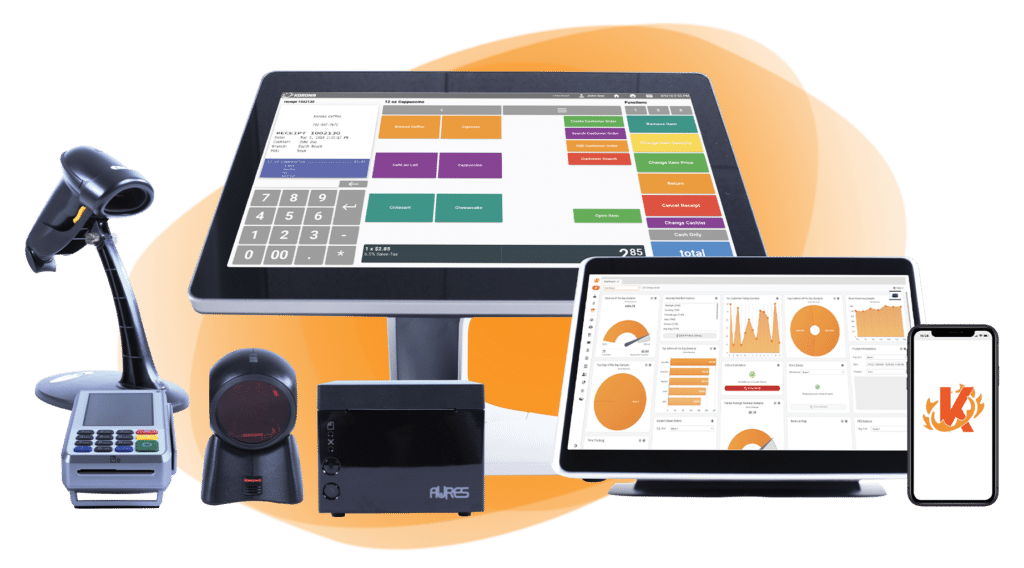
The modern POS incorporates all the elements of the traditional cash register but includes extensive additional features. It comprises several key elements streamlining sales operations and enhancing overall business productivity.
POS Software vs. Hardware
- POS Software – POS software enables businesses to process transactions, manage inventory, generate reports, and more. The software often includes user-friendly interfaces for cashiers and managers, making it easy to navigate and utilize.
- POS Hardware – POS hardware typically includes a computer or tablet, a touchscreen monitor, barcode scanners, receipt printers, and cash drawers. Point-of-sale hardware components work together to facilitate transactions.
POS System Functions
POS systems are celebrated for their user-friendliness and modern capabilities. These systems offer:
- Payment Processing: POS systems are equipped to accept various forms of payment, including cash, credit/debit cards, mobile payments, and electronic transfers. Integrated payment processing capabilities ensure secure and convenient customer transactions. Our in-depth guide explains the differences between POS systems and payment processors.
- Inventory Management: POS systems make inventory management straightforward and automatic. Businesses can use their POS to track stock levels in real time, receive alerts for low inventory, automate reordering processes, and generate reports to optimize inventory control.
- Reporting and Analytics: POS systems offer robust reporting and analytics tools that give users insights into sales performance, inventory turnover rates, employee productivity, and more.
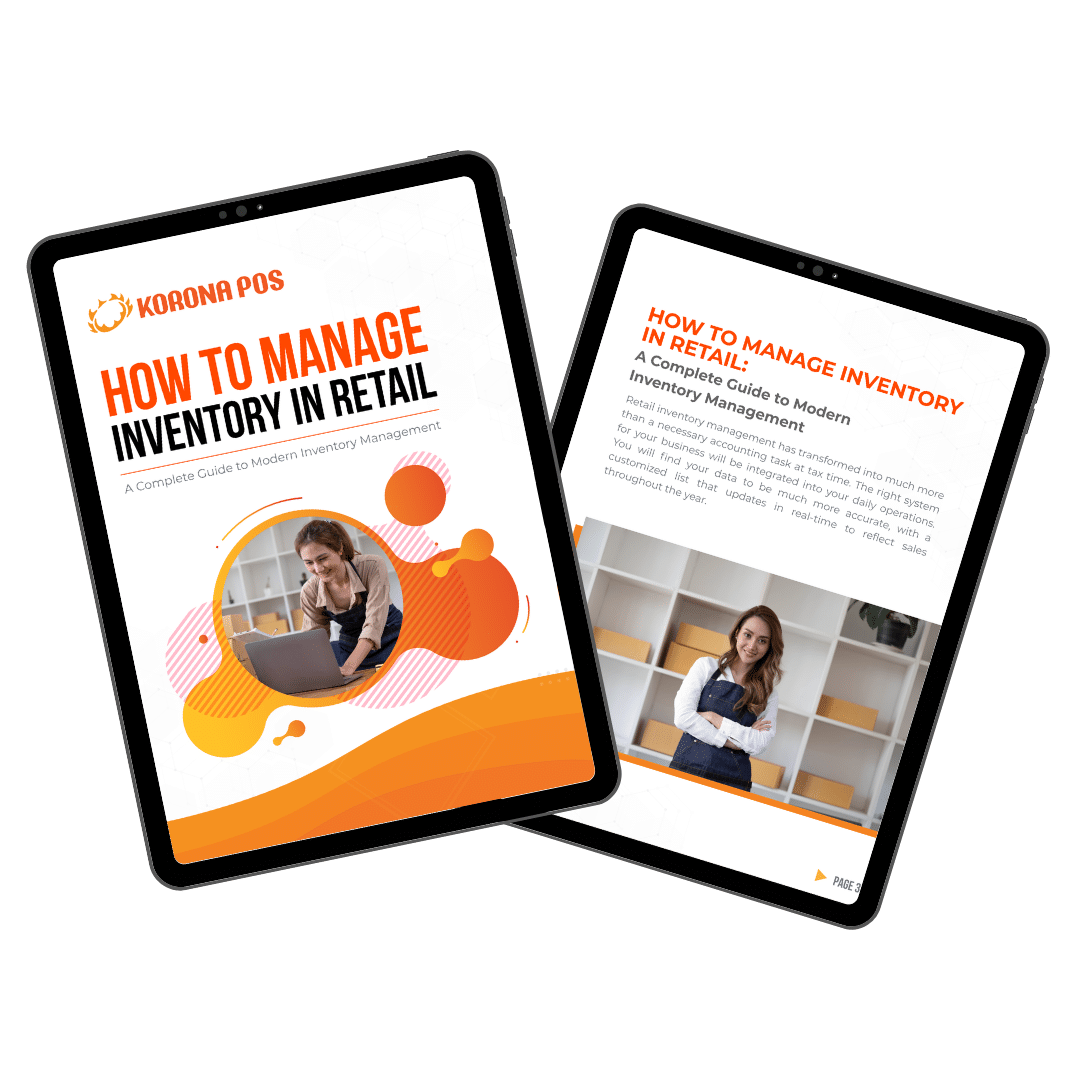
Learn how to manage your inventory effectively with this free eGuide.
POS System Limitations
- Complexity and learning curve – POS systems can be more complex to set up and operate than cash registers, requiring staff training and learning curves.
- Cost – While POS systems offer advanced features, they often come with a higher upfront cost and ongoing subscription fees, making them less accessible for small businesses with limited budgets.
- Dependence on technology – POS systems rely on internet connectivity and hardware components, making them susceptible to downtime or technical issues that can disrupt business operations. Cloud-based POS systems are more reliable but still require a wi-fi connection.
What is a POS Cash Register?
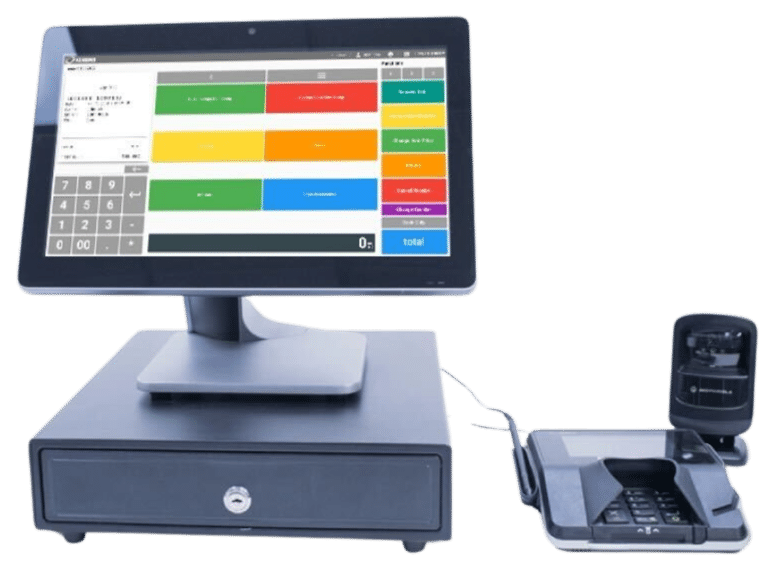
A POS cash register integrates both systems’ functions to streamline sales transactions and cash handling in a retail or hospitality setting.
The POS system is the central hub for managing sales, inventory, and payment processes, while the cash register helps users securely handle cash transactions. Together, they ensure that all cash-related transactions are documented and secure while generating real-time sales, cash flow, and inventory reports in real-time.
Why Might a Business Choose to Use a Cash Register?
Cash registers offer a straightforward solution for handling transactions without the complexity of digital systems. Some examples of businesses that may use only a cash register include:
- Cash-only businesses – Some places are still cash-only! For example, many famous bars in New Orleans and New York City are cash-only and use cash registers instead of modern POS software. These types of businesses often prefer the nostalgic aesthetic of a cash register and attract a specific clientele. In this case, they will sacrifice the lack of modern payment options.
- Simple or experimental pop-up shops – Pop-up shops often choose a simple cash register over a POS system due to their temporary nature. Because these shops only operate for short durations, setting up a complete POS system can be impractical and time-consuming. Limited space and resources make a compact cash register a convenient choice.
- DIY concerts or art events – Similarly to pop-ups, people throwing DIY events might choose to operate a cash-only, off-the-books experience. In this instance, the extra features of a digital point of sale aren’t necessary.
What Businesses Need a Modern Point of Sale System?
Most retail businesses need a digital point-of-sale to operate efficiently and compete in today’s landscape. Here are some business types that should choose a modern POS system:
- Retail stores – Traditional brick-and-mortar retail stores typically handle a large volume of transactions and require robust inventory management to track stock levels accurately. Sales analytics provided by POS systems help retail stores understand customer preferences and buying patterns, enabling them to optimize their product offerings and marketing strategies.
- Restaurants and cafes – Food and beverage establishments rely on POS systems to process orders, manage inventory, and track sales in real time. Meanwhile, advanced POS functionalities, such as table management and bill splitting, enhance customers’ dining experience. Integration with kitchen display systems also ensures smooth communication between front-of-house and kitchen staff, reducing errors and improving service speed.
- Salons and spas – POS systems tailored for this industry often include appointment scheduling, client profiles, and inventory management features. Additionally, integration with booking software and accounting tools streamlines administrative tasks, allowing salon owners to focus on delivering exceptional service.
Ready to take your business to the next level?
Boost store performance and improve sales with the advanced features and tools KORONA POS offers.
Cash Register vs. POS System FAQs
What is the difference between a cash register and a POS?
A cash register is a standalone device primarily used for processing sales transactions and storing cash. It typically lacks advanced features such as inventory management and digital payment processing. On the other hand, a POS system is a comprehensive software solution that integrates multiple functions, including sales processing, inventory tracking, and analytics, often accompanied by hardware like touchscreen terminals and barcode scanners.
What are the disadvantages of a cash register?
Cash registers have limitations compared to modern point-of-sale systems. They lack advanced functionalities such as inventory management, sales analytics, and digital payment processing, which hinders business efficiency and growth. Additionally, cash registers require manual input and calculation, increasing the risk of human error in transactions and accounting processes.
Do people still use cash registers?
People still use cash registers, particularly in small businesses and certain industries where cash transactions remain common. Their simplicity and affordability make them especially appealing for businesses with limited budgets or those operating in environments where digital systems may be impractical. Nonetheless, most retailers use modern POS systems that incorporate cash drawers into their hardware.
Final Thoughts
In today’s retail environment, some businesses opt for the nostalgia and simplicity of a classic cash register. However, most businesses require the advanced functionalities of modern POS systems. They empower retailers to enhance efficiency, improve customer experience, and stay competitive in an increasingly digital marketplace.
KORONA POS is ideal for wineries, vape shops, dispensaries, multi-store operations, liquor stores, convenience stores, ticketing services, and beyond. Click the link below to learn more about how KORONA POS can help you optimize your business.
Get started with KORONA POS today!
Explore all the features that KORONA POS has to offer with an unlimited trial. And there’s no commitment or credit card required.


